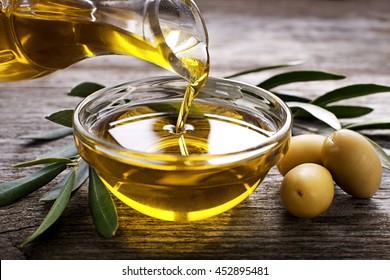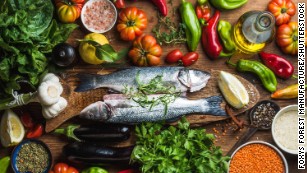Using olive oil instead of these foods could add years to the life of your heart, study says

(CNN)The
health benefits of the Mediterranean diet are renowned: Lots and lots
of veggies, fruit, fish and olive oil have been shown to strengthen bones, improve brain health and reduce the risk for some cancers, diabetes, high cholesterol, heart disease and stroke.
People living around the Mediterranean Sea are well-versed in the daily use of olive oil.
Residents of the United States? Not so much. They mostly choose to cook with butter, margarine and soybean or canola oil.
Now
a new study of Americans shows that replacing a mere five grams of
margarine, butter or mayonnaise with the same amount of olive oil was
associated with up to a 7% lower risk of coronary artery disease.
To
put that into context, five grams is about a half pat of butter or
margarine and one teaspoon of mayonnaise or fatty dairy products.
Even
better, people who used even higher olive oil intake -- more than seven
grams, or 1/2 tablespoon a day -- had a 15% lower risk of any kind of
cardiovascular disease and a 21% lower risk of coronary artery disease.
It didn't appear to have an impact on stroke risk, however.
The
preliminary research was presented Wednesday at the American Heart
Association's Prevention, Lifestyle and Cardiometabolic Health
Scientific Sessions 2020.
Replace, don't add
"Don't
just add olive oil to your regular diet. Substitution is what's
important here," said study author Dr. Frank Hu, who chairs the
department of nutrition at Harvard T.H. Chan School of Public Health.
"The
main thing is to replace unhealthy fats with olive oil and that can
improve cholesterol, reduce inflammatory biomarkers and improve
cardiovascular health," he said.
The results echoed a 2013 study of over 7,000 people,
one of the largest ever done. It found people who followed a
Mediterranean diet supplemented with extra virgin olive oil for five
years had a 30% lower risk of heart attack or stroke.
They
also showed a slower rate of cognitive decline and were better able to
control their weight. That's encouraging, considering the high calorie
count of olive oil -- about 120 calories in each tablespoon.
Cooking with olive oil
Rumors that the "smoke point" or burning point of olive oil would release harmful compounds were squashed by a 2018 Australian study
which found that EVOO -- extra virgin olive oil -- was actually more
chemically stable at high temperatures than other common cooking oils.
Extra
virgin olive oil (but not regular olive oil) produced the lowest levels
of trans fats and other potentially harmful byproducts when heated to
temperatures even higher than those commonly used for sauteing,
deep-frying and baking. Coconut oil took second place.
Canola
oil, an American favorite, was the most unstable, creating over twice
as many harmful compounds than extra virgin olive oil and well above the
"limits permitted for human consumption," the study found.
Of
course there are many ways to enjoy olive oil -- whether it's extra
virgin or not -- other than just in a frying pan. Olive oil is perfectly
suited for "emulsifying" two ingredients together -- mayonnaise is one
example. Salad dressings and vinaigrettes made with olive oil are
another. Pesto is made with olive oil. And roasting vegetables, salmon
and other foods with a sprinkle of olive oil brings out the flavors, say
experts.
Get CNN Health's weekly newsletter
Sign up here to get The Results Are In with Dr. Sanjay Gupta every Tuesday from the CNN Health team.
"We're
talking about moderate changes in eating behaviors," Hu said. "Instead
of using butter for your bread, dip it in olive oil. Instead of using a
store-bought salad dressing, use olive oil and vinegar instead.
"These small changes can have significant health benefits in the long run."






No comments